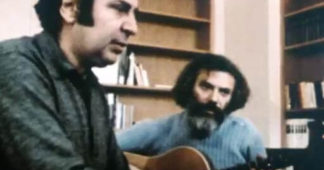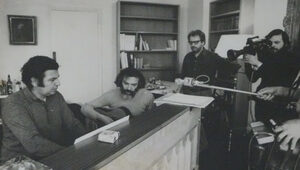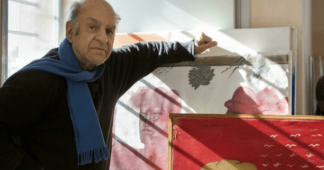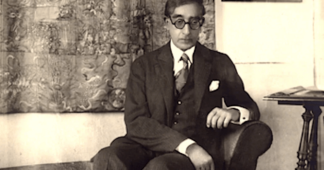At the age of 92, a great figure of Greek culture, the director, writer, poet, Roviros Manthoulis, died in Paris on the morning of Holy Thursday, April 21, 2022.
Ο Roviros Manthoulis has been hospitalized in a Paris hospital since the beginning of the week with a coronavirus.
It is not yet known where his funeral will take place.
His CV
His life was an adventure as it seems from the short biography he had sent to HuffPost: He was born in Komotini. As a teenager, he took part in the Resistance. He studied Political Science in Athens and Directing in America, 17 years old, he published his poetry collection “Stairs”. Since then he has made 122 films (most of them on French television), published 17 books and directed ERT-1 and ERT-2.
A detailed biography from the website of the Parliament testifies to his fictional life, from his childhood.
Roviros Manthoulis was born in Komotini and grew up in Athens. He participated in the circles of Children’s Physique and in the lines of EAM of Youth and continuation of EPON. From the end of 1943 until the Liberation, it was the “funnel” of Exarcheia and Naples, which brought in the evenings, from a terrace on the hill of Strefi, the messages of resistance in front of the open windows of the neighborhoods.
After high school he studied Political Science in Panteion and published his first book, the poetry collection Skalopatia (1949). His teacher in poetry was Nikiforos Vrettakos and his company, in the literary loft of Loumidis, were, among others, Michalis Katsaros, Nikos Gatsos, Manos Hadjidakis, the critic Alekos Argyriou and the director Frixos Iliadis, published the famous magazine “Poetic Art”. From 1949 to 1953 he studied Film and Theater at Syracuse University in New York State.
It was there that the first American file was opened to him, when he published an anti-McCarthy article in the Syracuse newspaper. McCarthy had his headquarters in this city, in the offices of the Federation of Veterans.
His second case was opened in 1972, when he was shooting the movie “Blues with clenched teeth” in Haarlem. When he returned from America in 1953, he initially collaborated with the “Wednesday Theater” of the E.I.R., bringing a new radio technique to theatrical adaptations. With Michalis Katsaros, who found himself again in Loumidis, they founded a film company that soon disbanded.
Wanting to help with his film education, he took over the direction of studies at two consecutive film schools. At the Stavrakos School, where Karolos Koun, Mikis Theodorakis and Giannis Tsarouchis had already taught, he had collaborators Grigoris Grigoriou and Giannis Bakogiannopoulos. At the Ioannidis School, he had hired Christos Vachliotis, in the acting department.
The friendship that connected them was extended to many of his worthy students such as Iraklis Papadakis, Fotis Mesthenaios, Leon Loisios. (In the two documentaries that Loisios shot in Lesvos, Mesthenaios was the cameraman, Manthoulis was the editor and Bakogiannopoulos wrote the narration).
Among his most famous students were Pantelis Voulgaris, Nikos Nikolaidis imitris Kollatos and Vassilis Rafailidis, who also became his assistant in a documentary.
In the meantime, Manthoulis had undertaken to organize the documentary department at the Ministry of Press and Information, but within a year he was fired. It was only then, in 1958, that he made his first film, a documentary about Lefkada, which should be, perhaps with a difference in breasts, the first Greek documentary.
In Lefkada he also uploaded the poetic work of William Saroyan “My Heart is up there”, after 7 months of rehearsals and some performances at the Athens Theater. In this, George Papastefanou made his first appearance, in the role of a child and the current writer Stratis Xaviaras, in the role of a 90 year old man! Manos Eleftheriou had taken part in the peasants’ dance – he brought oranges and eggs to the “old” Xaviaras when the dance heard him play a military trumpet song by Ben Johnson, sung in the London lodges in the early 17th century./p>
The dissemination of the documentary in Greece became an obsession in Manthoulis and in 1960 he founded the “Group of 5”, with Iraklis Papadakis, Fotis Mesthenaios, Giannis Bakogiannopoulos and Rousso Koundouros. After an orgasm of enlightenment of the public and government agencies, with lectures, screenings, festivals and film clubs, they all turned to film a series of films for various organizations and make a living from it. The “Acropolis of Athens” (1961), which returned with Ir. Papadakis and F. Mesthenaios (and the great archaeologist Giannis Miliadis), sold to 3,000 universities in America).
Their films each time won the award of the Thessaloniki Film Festival. “The Greatest Power” in 1961, “People and Gods” in 1965 with the voice of Kimonas Freier (translator of Kazantzakis’s Odyssey into English) which was broadcast every year for 5 years by the American network NBC. In 1959 Manthoulis accepted a proposal by Mr. Antonis Zervos (of the well-known company ANZERVOS, which had studios, distribution and many cinemas) to shoot a Greek comedy – “Mrs. Mayor” (1960) – starring Georgia Vassiliadou and Vassilis Avlonitis, Nikos Kourkoulos in a supporting role, Kazantzidis and Marinella in a first film appearance and Fotis Mesthenaios as director of photography.
The same happened with “Papadopoulou Family” (1961), written by Vangelis Goufas, with Orestis Makris, Dino Iliopoulos, Pantelis Zervos, Kakia Analyti, Stefanos Lineos and Thanassis Vengos, before he even started growing up of roles. One of the greatest, who also won the Critics’ Award for Best Actor, will be in Manthoulis’s next film “Hitler’s Hands Up” (1963), co-starring Vassilis Diamantopoulos. In this film, Manthoulis raised the bar of quality even more, in order to pass all the atmosphere and the authenticity of the Occupation, with the result that, apart from the critics’ awards he received then, it was played as a “national” film on national anniversaries./p>
The next step was a personal film. The trigger was given by the Julians. “Hitler’s Hands Up” was a first political film, but “Face to Face” (1966) will be even more caustic. Through the caricature of the rising newly wealthy class of shipowners and builders, who demolished and disfigured Athens, it was necessary to note the dictatorial tendencies that threatened political legitimacy and freedoms, which had just begun to return to Greece with so much effort. Such a film was not easy to make, because Censorship also took care of it.
Many contributed with small financial contributions or with their work. The script was not submitted to Censorship and filming began with permission for a previous documentary. The copy managed to leave the workshop to take part in the Thessaloniki Film Festival 1966, a great year with very good films. There he aroused the student youth, impressed foreign critics and won the Golden Award for Directing, as it was called at the time. The signatures of the jury are impressive: Giannis Tsarouchis, Manos Hadjidakis, Elli Lampeti, Filopoimin Finos, Giannis Bakogiannopoulos, Grigoris Grigoriou & # 8230; For the first time, perhaps, the audience that was waiting for the director at the exit, lifted him on his shoulders, like an Olympian, and took him to the surprised French critics who were waiting for him in the cafe to interview him.
The following year, “Face to Face” was invited to take part in various festivals, starting with the International New Film Festival in the city of Yer in southern France. Exceptionally and out of competition, because the Festival accepted only the first films of directors, while this was Manthoulis’ 4th.
The Festival started with “Face to Face” on April 21, 1967, the day that the junta coup took place in Greece! Of course, the film was prophetic, but such a coincidence could not be expected. It will probably be the first anti-echo event that took place abroad. With dozens of journalists, cameras and microphones.
Manthoulis’s interviews were broadcast the same night by several European radio stations and by the “Voice of Truth”, a radio station broadcasting from Eastern Europe. The following week, the Cannes Film Festival organized a special screening, ignoring the junta’s protests. Of course, the film was banned in Greece “all over the country, for reasons of general position”, the director’s passport was canceled, the police visited his house, his name was blacklisted by the press.
However, “Hitler’s hands are high” took the baton of resistance. During its screening in the dark rooms, the spectators, as soon as they heard the song of Christodoulou-Theodorakis, burst into slogans against the junta. It is the beginning of exile abroad. The film is set in Paris, the reviews are triumphant, the French television invites Manthoulis to collaborate. He commissioned him to direct an original program that would be shot in various countries (he was traveling, then, with a refugee passport “stateless”), exploring the political and social roots of spectacle, music and song.
It’s the age of the pop generation, the generation that opposes the Vietnam War and established values in general, and that, in France, will end in May ’68. The program, entitled “At the Poster of the World,” featured many famous artists, including Jacques Brel, Joan Baez, the Rolling Stones with Keith Richards and Mick Jagger, John Mayall, Sanra, Marion Williams. Johnny Halliday, George Mustache, Nureyev and many others. For the same program he made a documentary with Melina, Mikis Theodorakis and Maria Farantouri about the situation in Greece.
The “Poster of the World” was loved by both the public and the critics, who gave it the annual award for the best French show of 1969. “A single scene by Roviros Manthoulis, the acrobats performing their numbers over roulette in a casino in Las Vegas, it was enough to send the previous program to the trash “wrote Le Monde (22-3-1969). We owe the “Poster of the World” a rare moment. Nureyev in rehearsal, dancing with Claire Mott and talking to us about life and death. Excellent moments, at the height of the one who inspired them “writes L’Union (13-12-1969).
” We must say that the meeting of Georges Moustakis with Mikis Theodorakis exceeded all our predictions. Roviros Manthoulis managed with great skill to show us Theodorakis’s commitment (as if reading his thoughts) to passing his music to Moustakis. A deeply moving creation.
“After such a film, it is obvious that what followed was impossible to interest us,” writes L’Humanité (21-5-1970). The result of this success was to assign him the 3rd channel, which in the meantime was preparing to broadcast, to direct a documentary about the blues.
Manthoulis shot “Rising Mississippi” in America and with this film he opened the channel on January 3, 1973. At the same time, he shot in Harlem the feature film “Blues with clenched teeth”, which was played in cinemas the same year and was released. enthusiastic reviews. The film was screened at various festivals and in the Best Films of the Year section of the London Film Festival. Best Film of the Year was also chosen by Belgian critics (along with Fassbinder’s “Marriage of Maria Brown” and Gunay’s “Herd”). Then begins the series of cultural documentaries with the general title “One country, one music”, which brought Manthoulis to many countries of the 5 continents (Ireland, Hungary, Egypt, Yemen, USA, Sicily, Cuba, Argentina, Brazil, Canada , Australia, Israel, etc., and in Greece when the junta fell).
He had previously “directed” over the phone the scenes shot by the cameraman Fotis Mesthenaios in Greece during the dictatorship for the film “Cry of Silence”. Meanwhile, Melina is excited about the film that Manthoulis made for her for “Poster of the World” and suggests him an American film produced by Dassen, entitled “Lilly’s Story”. Manthoulis writes the script in English (with Giorgos Sevastikoglou) and sends a French crew to secretly shoot scenes in Athens, where he is arrested outside the Security on Bouboulinas Street.
In the end, the film was not shot because on the eve of the shooting the producer company was dissolved. And he could not return to Romania either, because it was banned by Ceausescu, who had signed a trade agreement with the junta in those days. Shortly after the fall of the junta, the government proposed to Michalis Kakogiannis to take over Television (1975).
He refused and suggested Manthoulis. Karamanlis assigns him the artistic direction of ERT, which in the meantime had become a public limited company. Manthoulis accepted for a year.
During this time he tried to make the program relevant, with his collaborators Giannis Bakogiannopoulos, Petros Markaris, Tonia Marketaki and others. He brought in the French editor Dominique Colonna to start a series similar to those he was shooting in France. He christened it “Backstage” and assigned it to worthy young directors such as Papastathis and Hatzopoulos.
At the same time, he made a noon program, “Every noon”, which from the first day was loved by the public, imposed live programs, which did not exist then because of the fear of the Jews, created “A movie, a conversation”, brought the film crews on television and shot the first serials in a film, such as “The village photographer” and “The teacher with the golden eyes”, remodeled the “Theater of Monday” (which reached 90% viewership), inaugurated “Music Nights” with George Papastefanou, starting with a “George Moustaki Night” and limited the American program by bringing European serials, such as the French “Black Bread”, the Italian “Pinocchio” and others from the Balkan countries (and of course he accepted protests from the American embassy & # 8230;).
Among other things, he managed to persuade the angry with the government Manos Hadjidakis, who was preparing to resign, to remain in the Third Program. In his days, ERT Thessaloniki was also founded (today’s ERT-3). When Manthoulis took over ERT, YENED, the television channel of the Ministry of Defense, had 75% of the viewers and ERT 25%. When he left, the percentages were reversed, with the result that he was accused by the Minister of Defense (Ev. Averoff) in the Council of Ministers of unfair competition. When, finally, some employees of KYP were appointed to ERT and started sabotaging the program, Manthoulis resigned.
Manthoulis continued his travels for French television and, returning from Tahiti, the new government of Andreas Papandreou invites him to take over YENEI, but he does not accept. She then asks him to find a way to rectify the chaos created on ERT because it was about to close. This also happened, ERT met and they ask Manthoulis to take over the artistic direction during the transformation of YENED, which in the meantime came under the responsibility of the Ministry of the Presidency, to ERT-2. He did what he could with his collaborators Leonidas Zenakos, Vassilis Vafeas and Nino Mikelidis, until he resigned to direct “Circumcised States” (1983-1986) of the Circus, a French co-produced television series that lasted three years. This serial has been broadcast only three times since then in Greece and 50 times on French television. There is no Frenchman who has not seen at least one episode of “Rule of Law”. “One of the most amazing and fascinating films I’ve seen on television in recent years,” François Sagan wrote in a tabloid for L’Évènement du Jeudi magazine.
In 1991, Manthoulis was elected President of the Hellenic Community of Paris, which he tried to turn into a Greek cultural center. He founded a film club there, launched a magazine and organized seminars with academics, like a popular university. At the same time, he made a series of films about the Greeks of Paris. He presented to the members of the community many Greek politicians (Costa Karamanlis, Aleka Papariga, Nikos Konstantopoulos, George Papandreou etc.). After ten years he resigned from the community, after first organizing a Greek week entitled “Greece on the Seine”, in collaboration with the Municipality of Paris, presenting the Greeks who participate in the cultural activities of France (Costa Gavra, Vassilis Alexakis, Giannis Kokko, Antigoni Ionatou, the painter Pavlos).
For the first time in history, the mayor welcomed a foreign community. Two thousand members of the Greek community spent one night in the repressed halls of the Paris City Hall, which began with a recital by soprano Alexandra Papatziakou and pianist Giannis Vakarelis. Someone said (Vassilis Alexakis I think) that the last time something like this happened was Rossini’s concert in support of the Revolution of 1821 & # 8230 ;. The City Council awarded him the Medal of the City of Paris for his cultural activity in France. At the same time, Manthoulis is interested in the role of television in shaping young viewers, shooting the film “Bomber Television” and persuading the Minister of Mass Media to establish the Jules Verne Institute to strengthen educational programs. >
Culture Minister Jacques Lang commissioned him to make a film about Reims Cathedral, which was shown overnight at the temple, and persuaded the champagne producers, who had been invited to donate 100 million francs to restore the temple and preserve the 2,000 statues that decorate. The French Ministry of Culture instructs Vassilis Alexakis to invite Greek writers to France and Manthoulis the playwrights. Iakovos Kampanelis, Loula Anagnostaki and Giorgos Maniotis will come, whom Manthoulis presents at the Theater of World Cultures together with excerpts from their works played in French. This will lead to the presentation by Manthoulis of Maniotis’s work “The Common Logic” at the Avignon Festival, in the presence of the author. The show will be broadcast on state radio France-Culture.
In the meantime, Manthoulis focuses mainly on Greek issues and shoots the “Greek Civil War” and the “Dictatorship of the Colonels” for the French cultural channel ARTE (co-produced with FR-3 and NET) as well as the feature film “Lilly’s Story” (about how the old film with Melina was not shot), which was selected by the Venice Film Festival as an official entry in 2000. The film was shot in Paris, Greece, Slovenia and Hungary (because one of her episodes refer to the exile there Dimitris Hatzis). During this period he published new books (the previous one was The State of Television) by Exantas Publications: The Ancient Erotic Vocabulary, for the slang of the ancient Greek language, Mimiabs by the Alexandrian comedian Heron in translation and commentary, the experiential novel L Blues with Tight Teeth, chronicle of the shooting of the film, The Diary of the Civil War, 1900-1974 by Kastaniotis et al., A total of 17 books to date. (The last three of them are THE WORLD AGAINST US, THE METAMORPHOSIS OF APHROPHY and MONTAGE, by Gavriilidis Publications). (From the biography of the Publication of the Youth Plan Doviros Manthoulis-A Life Films on the occasion of the Olympia International Film Festival for Children and Youth 2006).
Source: politis.com.cy / Published at cyprus-digest.com
Also read
Robert Manthoulis : le cinéma de l’exil
We remind our readers that publication of articles on our site does not mean that we agree with what is written. Our policy is to publish anything which we consider of interest, so as to assist our readers in forming their opinions. Sometimes we even publish articles with which we totally disagree, since we believe it is important for our readers to be informed on as wide a spectrum of views as possible.











